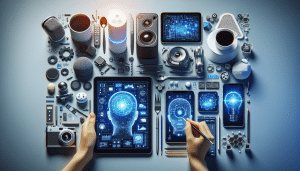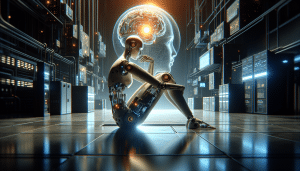The Surprising Ways Artificial Intelligence Impacts Your Daily Life
Aiden Foster September 15, 2025
Explore how artificial intelligence quietly shapes routines, choices, and innovations all around you. From voice assistants and smart home devices to personalized recommendations and emerging healthcare tools, this article unpacks the secrets powering everyday technology in the modern world.
Understanding Artificial Intelligence in Everyday Technology
Artificial intelligence, often called AI, is deeply woven into daily experiences. At its core, AI refers to computer programs and algorithms that mimic aspects of human intelligence, such as learning from experience, understanding language, and solving problems. Not long ago, AI sounded like science fiction, but today it is embedded in smartphone apps, voice assistants, and many internet searches. Each time a smartphone unlocks with a face scan or suggests routes in a navigation app, AI quietly works behind the scenes. These technologies rely on machine learning, a subset of AI that enables systems to adapt based on the data they process. Machine learning algorithms filter spam from email inboxes and power chatbots that answer basic questions online. AI is now an invisible partner, streamlining countless tasks and boosting convenience. (Source: https://www.nsf.gov/news/special_reports/ai/)
One key reason artificial intelligence integrates so seamlessly into technology is its ability to automate repetitive processes. When setting reminders or fetching the weather, most digital assistants don’t just follow a script. Instead, their algorithms interpret language, context, and even intent, making responses feel surprisingly natural. This ability to process natural language is what sets modern AI-powered tools apart from simple rule-following programs of the past. In business, AI streamlines repetitive tasks, analyzes vast data sets, and helps flag potential security issues, quietly reducing workloads and increasing productivity. The ripple effect continues in transportation, banking, and online retail, making every interaction more personalized and responsive.(Source: https://www.nist.gov/artificial-intelligence)
With smartphones, smartwatches, and connected home gadgets, most people encounter AI many times each day. Yet, much of what makes these experiences effortless happens in the background. Consider how image recognition helps organize photos or how voice recognition quickly transcribes audio for texts and memos. Behind each instant result, machine learning models analyze patterns, categorize input, and continuously improve with every user interaction. AI’s reach is expanding further, now influencing the development of robotics, smart appliances, and even autonomous vehicles. By learning from massive streams of data, these applications anticipate needs, making daily routines not just easier but more intuitive.
AI and Personalization: Transforming Recommendations and Experience
The concept of personalization in technology has soared thanks to artificial intelligence. When browsing streaming platforms or online stores, recommendations aren’t random suggestions. AI systems analyze your viewing habits, search queries, and preferences, constantly refining their models to predict what you might enjoy next. This ability to personalize content dramatically shapes digital experiences, making them more relevant and engaging. For example, music apps assemble custom playlists and news feeds tailor themselves to specific interests, often before you even ask. This personalized approach not only saves time but also enhances engagement with technology. (Source: https://www.technologyreview.com/2020/06/11/1002549/ai-personalization-privacy/)
Personalization extends beyond entertainment and shopping. Email clients filter out distractions, prioritizing messages likely to matter most. Social media platforms use AI to curate feeds, aiming to boost relevant content and filter inappropriate material. Even traffic alerts in navigation apps adapt to behavior, identifying preferred routes to provide timely detours during congestion. For businesses, this broad range of tailored experiences is invaluable. AI-driven insights help companies anticipate needs, serve targeted recommendations, and build loyalty through customized engagement strategies. These subtle changes foster stronger connections, shaping consumer habits over time.
There’s a growing awareness of how AI-powered personalization is shaping online environments. Many users appreciate highly relevant suggestions, but concerns over privacy and data use persist. The algorithms that power these recommendations require access to data—such as search history, app activity, and sometimes even location. Balancing personalization with privacy introduces new challenges for designers, regulators, and end users alike. Transparent privacy controls and careful data stewardship are essential to ensure AI-powered personalization remains helpful, relevant, and trustworthy. (Source: https://www.csoonline.com/article/3531419/how-ai-is-shaping-personalization-and-privacy.html)
Smart Homes and Daily Convenience Powered by AI
Smart home technology is quickly becoming a staple in modern residences. Artificial intelligence is at the heart of this transformation, seamlessly integrating with lighting, heating, security, and entertainment systems. Devices like smart thermostats learn family routines, optimizing heating and cooling schedules to increase comfort and energy efficiency. Security cameras now use AI to recognize familiar faces, reducing false alarms and providing peace of mind. In kitchens, intelligent appliances adjust cooking settings for optimal results, transforming the way households manage everyday chores. (Source: https://www.energy.gov/articles/smart-homes-how-artificial-intelligence-changes-way-we-live)
Voice assistants play a pivotal role in smart home ecosystems. These digital helpers understand commands, schedule reminders, and control connected devices with simple phrases. AI-powered assistants are constantly evolving, better understanding speech, accents, and even context. Smart speakers now orchestrate entire home routines, dimming lights, locking doors, and updating users about traffic—all with a short request. Over time, these platforms learn unique patterns and preferences, creating solutions tailored to each household’s needs. As new products arrive, interoperability and customization become vital, allowing different devices and brands to work harmoniously together.
Smart home innovation doesn’t stop at convenience. AI-driven energy management helps reduce utility costs by analyzing consumption patterns and suggesting ways to save. Aging-in-place solutions use sensors and learning systems to monitor health and wellness, sending gentle reminders to take medication or alerting caregivers to unusual activity. These advances promise both comfort and independence for older adults or those with mobility challenges. As smart homes become smarter, AI’s ability to adapt and respond to real-world needs becomes more pronounced, bringing new possibilities to the way people live and interact with their environments.
Healthcare Innovations: AI’s Growing Role in Medicine
Artificial intelligence is driving a quiet revolution across healthcare. AI algorithms analyze vast amounts of clinical data, enabling earlier detection of disease patterns and more accurate diagnoses. In medical imaging, AI tools now assist radiologists in identifying subtle changes in scans, sometimes catching conditions at earlier and more treatable stages. These technologies also power virtual health assistants, helping patients understand symptoms, find reliable information, and track personal wellness. By processing health records and predicting potential risks, AI aims to improve both patient outcomes and healthcare efficiency. (Source: https://www.nih.gov/news-events/nih-research-matters/artificial-intelligence-healthcare)
Beyond diagnosis, AI simplifies many routine healthcare tasks. Automated systems manage appointments, answer insurance questions, and sort through test results, freeing up clinicians for more complex responsibilities. In research, AI-driven analysis accelerates the pace of discoveries, identifying promising drug candidates and uncovering patterns we might otherwise miss. During global health challenges, AI models help track outbreaks, suggest strategies, and coordinate large-scale responses by synthesizing information from many sources. These efforts demonstrate how AI is becoming an indispensable partner in 21st-century medicine.
Ethical considerations remain a significant part of the conversation around AI in healthcare. Responsible data handling, fairness in decision-making, and maintaining patient trust are essential. Developers and health institutions work together to ensure that AI-enhanced solutions prioritize safety and inclusivity. As research advances, new guidelines foster transparency and accountability. The collective goal: smarter decision support systems that promote access, efficiency, and quality care—without compromising ethical obligations. The promise of AI in healthcare continues to grow, offering hope for better prevention, personalized treatment, and early intervention for serious illnesses.
Ethical Questions and the Human Touch: Navigating Limitations
AI’s expanding influence in daily life raises complex ethical questions about privacy, safety, and fairness. When algorithms make decisions—sorting job applications, screening loan applicants, or suggesting content—it’s crucial that outcomes are transparent and just. Bias in training data can inadvertently affect decisions, so organizations must assess and continually monitor the fairness of AI systems. Public awareness grows as stories about algorithmic error or unintended consequences make headlines. Addressing these concerns is central to keeping AI trustworthy and beneficial for all. (Source: https://plato.stanford.edu/entries/ethics-ai/)
Transparency is key. As people encounter AI-powered tools in more profound ways—say, in autonomous vehicles or health diagnostics—they expect clear explanations for decisions that impact their lives. Calls for “explainable AI” have led to a push for designing systems that not only deliver results but also provide understandable reasons behind their choices. Regulation, standards, and public discussions shape development practices, helping guide ethical deployment in sensitive fields like finance, healthcare, and law enforcement. Robust oversight ensures the human touch remains at the center of decision-making, especially where stakes are high.
It’s also clear that artificial intelligence, for all its capabilities, cannot replicate uniquely human qualities such as empathy, creativity, and ethical judgment. The most successful applications use AI to support—not replace—human expertise. Assisted diagnosis, collaborative robots, and personalized learning platforms all aim to amplify what people do best. Ongoing conversations in academia, industry, and policy focus on maximizing the advantages of AI while preserving autonomy, dignity, and choice. As technology becomes ever more sophisticated, these values provide the stable foundation for responsible innovation.
Emerging Trends: What’s on the Horizon for AI?
Artificial intelligence continues to evolve rapidly, with new trends impacting daily life and work. Edge computing allows machine learning models to run directly on devices like phones or cameras, processing information locally instead of sending everything to remote servers. This advancement boosts privacy, reduces delays, and empowers real-time applications, such as instant translation or predictive maintenance in industrial settings. At the same time, AI models themselves grow larger and more capable, learning from wider data sources to solve complex problems with unprecedented speed. Innovations such as deep learning and reinforcement learning are paving the way for autonomous systems—from warehouses to driverless cars. (Source: https://ai.googleblog.com/)
Another major trend is the democratization of AI tools. Cloud-based platforms, low-code solutions, and open-source resources make it easier for individuals, startups, and researchers to create intelligent solutions. Education and training initiatives aim to ensure everyone can understand and benefit from this technology, no matter their background or expertise. Advances in language models fuel breakthroughs in translation, summarization, and accessibility, bringing enhanced communication and support to users who speak a diversity of languages. These developments open up new possibilities for innovation, creativity, and expanded access to information worldwide.
The next chapter of artificial intelligence will likely see stronger collaboration between human insight and machine capability. As challenges like misinformation, environmental sustainability, and healthcare require adaptable solutions, AI can serve as a powerful tool in solving society’s most pressing problems. The potential is enormous, but realizing these benefits depends on thoughtful stewardship and broad participation. Staying informed and engaged empowers more people to shape how AI is used in constructive and equitable ways, making the future of technology both exciting and full of promise.
References
1. National Science Foundation. (n.d.). Artificial Intelligence. Retrieved from https://www.nsf.gov/news/special_reports/ai/
2. National Institute of Standards and Technology. (n.d.). Artificial Intelligence. Retrieved from https://www.nist.gov/artificial-intelligence
3. Technology Review. (2020). Artificial intelligence, personalization, and privacy. Retrieved from https://www.technologyreview.com/2020/06/11/1002549/ai-personalization-privacy/
4. U.S. Department of Energy. (n.d.). Smart Homes: How Artificial Intelligence Changes the Way We Live. Retrieved from https://www.energy.gov/articles/smart-homes-how-artificial-intelligence-changes-way-we-live
5. National Institutes of Health. (n.d.). Artificial Intelligence in Healthcare. Retrieved from https://www.nih.gov/news-events/nih-research-matters/artificial-intelligence-healthcare
6. Stanford Encyclopedia of Philosophy. (n.d.). Ethics of Artificial Intelligence and Robotics. Retrieved from https://plato.stanford.edu/entries/ethics-ai/








